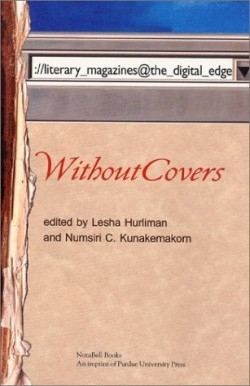
Without Covers
://literary_magazines@the_digital_edge
Traditionally, literary magazines act as a proving ground, identifying and publishing emerging writers. Unfortunately, most literary magazines are marginal operations, chronically under-funded and faced with daunting problems of printing, warehousing, distribution, and bookstore shelf space. The temptation of online publishing looms large.
As literary magazines move to the Web, what happens to the traditional in-print forum for new work and fresh ideas? The editors (Hurliman is a writer and Kunakemakorn is the former editor-in-chief of the Sycamore Review) have collected eighteen thoughtful essays on the question. Generally, the essays avoid Luddite affectation while voicing carefully considered skepticism and concern.
Among the contributors, there is a collective veneration for the materiality of the book and a discomfort with the online reading experience. Novelist R. M. Barry confides, “My book on the shelf is the single best verification that I exist.” Short story writer, Walter Cummins, predicts that ergonomic limitations will be corrected and reminds that, for a younger generation, online reading is just one more norm of daily living.
Several contributors discuss the kinds of writing and reading that are most effective online. Among them, essayist Heather Shayne Blakeslee notes that the writing that’s best suited to the Web-information, news, entertainment-is not the kind of writing that brings her the most pleasure, and poet Lucia Perillo fears that online reading robs us of our capacity to dwell.
None of the essayists deny the accessibility advantage of work published online. In-print literary magazines are hard to find and expensive to buy, while online an audience of millions is a mouse click away. Of course, the flip side to easy access is devolution into meaningless babble; and several contributors suggest that there will always be a need for someone to sort through the slush pile, whether physically or online.
The literary reader will find reassurance in this collection, particularly in the observation of ZYZZYVA editor Howard Junker that “litmags will become a repository for all that the Web has no patience for: feelings, complexities, privacies, verbosities.” There is a consensus that the best response to the new technology is to remain open to its practical advantages and expressive possibilities. As Iowa Review editor David Hamilton advises, “It behooves little magazines… to give newer things a chance.”
Reviewed by
Rob Mitchell
Disclosure: This article is not an endorsement, but a review. The publisher of this book provided free copies of the book to have their book reviewed by a professional reviewer. No fee was paid by the publisher for this review. Foreword Reviews only recommends books that we love. Foreword Magazine, Inc. is disclosing this in accordance with the Federal Trade Commission’s 16 CFR, Part 255.
